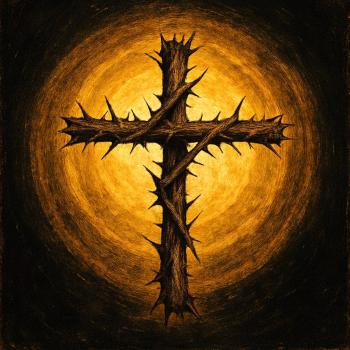As Messiah, Jesus of Nazareth comes each time in victory, ultimately victory over death and sin (Judges 5:1-5; Isaiah 19:1; Mormon 7:5). He comes as king, rightful ruler of the world and its inhabitants (Deuteronomy 33:2-5; Alma 5:50). But more than anything else, he comes always as the Messiah of peace (shalom) (Zechariah 9:9-10; Helaman 5:47; 2 Nephi 26:9; 3 Nephi 22:7-13;). More than the absence of war, shalom means wholeness and harmony. Christians wait patiently, expectantly, and firmly for the victory of the king who brings wholeness and harmony to individual lives and to the world.
The harmonious wholeness for which we wait is not to be understood as something confined to discrete events, two in the past and one yet to come. It is also central to the life of anyone who hears the message of the gospel: "the Lord is nigh" (Doctrine & Covenants 1:12, 35-36). To preach that the Lord is nigh is not only to warn people that the end of the world is soon to come—soon, on some time scale to which we are not privy. More than that, to preach the gospel is to preach that the revelation of shalom is near in both space and time, whatever the timing of the Second Coming. The preaching of the gospel directs us to look for what is already near us, and if we look we will see and hear. The kingdom is not something distant. It is at hand—around us, with us, before us—though when we do not hear the gospel we are deaf to the presence of the kingdom.
The kingdom is revealed, first of all, to and in us when we accept the reign of the Lord. Latter-day Saints believe they do that when they are baptized, and they explicitly profess to do so when they eat the elements of the Sacrament, the Eucharist (Moroni 4:3; 5:2). But that revelation of the kingdom is not once and for all. We must continue to hope for it, await it. To do that is to hope and long for the wholeness and harmony of the reign of God, something we must continue to enact even as we work for its further enactment.
To accept the call to wait patiently and contemplatively on the revelation of Jesus Christ is to live in the world differently than we would without that revelation. Unfortunately, though, the temptation to live as if there has been and will be no revelation of the Messiah is stronger than we usually recognize. We give into it more often than we know and need to watch against doing so. Seeing the sunset from my office window overlooking the valley and the lake, it is not so difficult to remember that I live in a world given by the Lord and into which he has come and will return. But reading an article on the latest discoveries in a science or standing in line at the tire store waiting to buy new tires or preparing lunch for my visiting grandchildren, I tend to live in the world in the same way I would were I not patiently waiting the Lord's reign. I am not waiting, patiently or otherwise, if my waiting makes no difference to the way that I find myself and take up my life in the world. But neither is it true that Christian life is life in which Christ has been fully revealed and nothing remains to be done. We are, after all, still in the time of this world, the time between his First Coming and his Second.
To live the life of Christian waiting on the Lord is to live in the world into which Jesus Christ has already come, both in the past and in our personal lives, and into which he will come again and continue to come until he comes in fullness. To celebrate advent is to live a life that celebrates the Savior's previous advents, that is hopeful for his future one, and that recognizes in patience, hope, love, and obedience—four aspects of the same thing—his ongoing advent in our lives.





